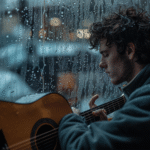Now Reading: The AI Debate is Tearing Through the Music Industry – But the Loudest Critics Keep Whispering Through ChatGPT –
-
01
The AI Debate is Tearing Through the Music Industry – But the Loudest Critics Keep Whispering Through ChatGPT –
The AI Debate is Tearing Through the Music Industry – But the Loudest Critics Keep Whispering Through ChatGPT –

There’s a strange kind of morality play playing out in the music industry right now, one that exposes the fault lines between genuine creative solidarity and self-serving double standards. Musicians across genres, scenes, and career stages are lining up to decry the encroachment of AI into music production. You’d think it was a Terminator sequel set in a studio, with the level of doomsaying and dystopian scaremongering pouring out across social media. But while the same artists cry foul over AI-generated songs, many are more than happy to let artificial intelligence polish their bios, design their album covers, or even write their press releases.
It’s not the use of AI that’s the problem, apparently. It’s the use of AI on their turf. If that isn’t the definition of cherry-picking morality, I’m not sure what is. This isn’t a defence of generative AI infringing on human-made art, but if we’re going to talk about exploitation, it needs to be a conversation rooted in consistency and collective accountability.
Because right now, there’s very little of that.
Hypocrisy Dressed as Integrity: AI for Admin, Not for Art?
It’s hard to take an artist seriously when they bang the drum about AI stealing their creative soul, while their Bandcamp description reads like it was spat out by a chatbot that confused adjectives with authenticity. AI-generated bios have become ubiquitous in the independent and underground scenes, especially among artists who baulk at the idea of paying a human writer. The logic is simple: why pay a professional when ChatGPT can string together “hauntingly atmospheric soundscapes” and “genre-defying compositions” in under ten seconds?
This isn’t a call to arms for music writers to reclaim their domain—most of us knew the rug was being pulled when the first AI-generated press release started doing the rounds. But it is a call to call out the selective outrage. If it’s okay to cut out human collaboration to save a few quid or look more professional, then why should audiences draw the line at AI replicating human voices or composition styles?
AI isn’t only threatening one type of creativity. It’s mechanising all of it. So, when musicians publicly rage against the machine, while privately whispering to it for help, they end up painting themselves as victims and complicit beneficiaries in the same breath. Obviously, there are those who are staunchly anti-AI in all areas of their life, but lets not pretend this phenomenon of hypocrisy doesn’t exist, yeah?
The Collapse of Solidarity in the Creative Industry
Historically, when new technologies have threatened to dismantle creative sectors, communities rallied. Think of the Napster wars. Love or loathe the lawsuits, there was a clear line drawn in the sand. Artists, labels, and even listeners came together to fight for the survival of human art. What we’re seeing now is something much messier and far more individualistic.
There’s no united front against the unchecked use of AI in music. Instead, it’s fragmented outrage. Visual artists are crying out about having their styles scraped and regurgitated by Midjourney. Writers are pleading with musicians to support ethical press and avoid slapping AI mush across every ‘about’ section. But musicians? They’re making dystopian TikToks about AI rappers while posting AI-designed album artwork with a winking emoji and a “made with magic” caption.
If you want to take a stand against the erosion of human creativity, you need to do it before your personal creative bubble is the one under threat. Otherwise, it’s just a tantrum disguised as activism.
The Cost of Convenience: When Automation Becomes Complicity
It’s understandable, to a degree. The creative industries are underfunded, underpaid, and oversaturated. When something promises to cut costs and save time, it’s tempting—almost necessary—to lean into it. But that doesn’t give anyone carte blanche to absolve themselves of the wider impact. Automation doesn’t happen in a vacuum. The second one creative role becomes obsolete, the pressure mounts on the rest to follow.
The freelance music journalist you no longer hire? That’s another perspective lost. The visual artist you used to commission? That’s another gig gone. And when AI music eventually passes the uncanny valley and becomes commercially viable? That’ll be your job up for grabs.
Every time an artist opts for convenience over collaboration, they don’t just save money. They signal to the rest of the industry that human creativity is optional. And once something becomes optional, it becomes expendable.
So Who Gets to Be Mad About AI Music?
Here’s the uncomfortable truth: if you’ve used AI to write your bio, if your album cover came from a prompt instead of a paintbrush, or if your press release was generated by a bot, you’ve already participated in the very mechanism you claim to oppose. That doesn’t make you a villain. But it does mean you’ve lost the right to gatekeep outrage.
You can’t build your house on AI-assisted labour and then throw rocks at the musicians trying to use AI as an instrument. If it’s okay for admin tasks, is it really that unthinkable for someone to experiment with AI to compose beats or melodies? Once the door’s open, it’s not your place to dictate who gets to walk through it or how.
That doesn’t mean everyone should embrace AI-generated music without question. But it does mean we need to stop pretending the line between ethical and exploitative use is fixed and obvious. If anything, it’s blurry and subjective, much like creativity itself.
The industry won’t survive on cherry-picked ethics. It needs messy, honest, inclusive conversations. It needs people who are willing to acknowledge their own complicity and work towards a creative future that doesn’t steamroll over human input—but also doesn’t treat AI like an enemy until it’s convenient.
Conclusion: Less Moral Panic, More Moral Consistency
We’re past the point where AI can be pushed back into the box. That ship has sailed, probably with an algorithm at the helm. What we need now isn’t more moral panic from artists who are only worried about AI when it knocks on their door. We need collective conversations about creative value, compensation, and what we actually want the future of art to look like.
If musicians want their creativity to be protected, they need to show up for the writers and artists already being replaced or undervalued by AI. Solidarity is a two-way street. You can’t expect the rest of the creative world to care when AI starts ripping melodies if you didn’t bat an eye when it started ripping bios and cover art.
We’re all in the same collapsing canoe. It’s time to stop drilling holes in each other’s sides while bailing out your own.
–
Article by Amelia Vandergast
Artwork by Etienne Class


























